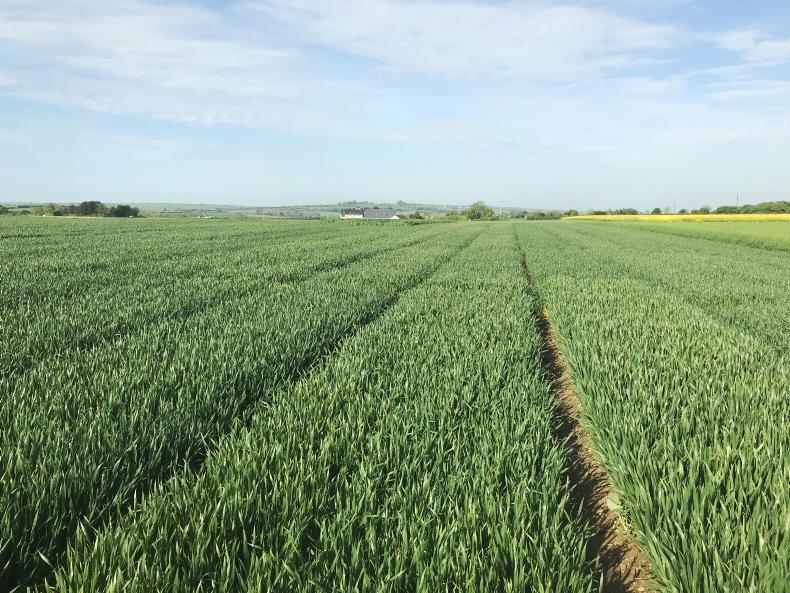A Teagasc report has concluded that the loss of chlorothalonil would have a massive effect on the viability of cereal farming in Ireland. The widely used chemical needs to have its licence renewed by the EU, with a decision potentially due this month.
Key findings
The report says the “most likely scenario” is for wheat gross margins to halve. Barley would fare even worse, with a collapse of gross margins to little over a third of current levels. This would mean cereal production would only be economic “on the highest-yielding sites with low costs of production”.
The risks of economic loss elsewhere “will increase dramatically”.
Chlorothalonil is a fungicide used for the control of septoria and ramularia, in particular. It is generally applied in the final fungicide spray in barley and in almost every spray in wheat.
There are fewer than 39 plant protection products containing chlorothalonil listed as approved for use in Ireland. They include well-known brands such as Bravo, CT 500, Avoca, and Joules.
Rover is a chlorothalonil product approved for use in beans, as well as the typical wheat, barley and rye. Chlorothalonil is also included in formulations such as Amistar Opti, Halo, and Cherokee, along with another chemical, usually a strobilurin.
Choice
Alternatives to chlorothalonil are thin on the ground. The only current products cited in the report are SDHIs and Folpel.
While SDHIs are widely used, the report cites concerns about resistance developing. Among SDHI products approved for use are Imtrex, Vertizan, and Zulu, with Elatus Era, Cauldron, and Priaxor EC examples of formulations containing SDHI’s with other products.
Folpel is approved under two product names, Phoenix and Arizona.
With a narrower range of products, there could be issues regarding product availability and cost if chlorothalonil is lost.
Wider effect
Irish livestock farmers should fear the conclusions of Teagasc’s analysis. The loss of chlorothalonil would affect grain acreage and yields, and reduce straw yield and quality. It could lead to straw scrambles like the one seen during this year’s harvest. While grain can be imported from anywhere in the world relatively easy, the loss of domestic grain tonnage would leave Irish farming more exposed to high prices in years like 2018.
Read more
The threat to Bravo is not good news
A Teagasc report has concluded that the loss of chlorothalonil would have a massive effect on the viability of cereal farming in Ireland. The widely used chemical needs to have its licence renewed by the EU, with a decision potentially due this month.
Key findings
The report says the “most likely scenario” is for wheat gross margins to halve. Barley would fare even worse, with a collapse of gross margins to little over a third of current levels. This would mean cereal production would only be economic “on the highest-yielding sites with low costs of production”.
The risks of economic loss elsewhere “will increase dramatically”.
Chlorothalonil is a fungicide used for the control of septoria and ramularia, in particular. It is generally applied in the final fungicide spray in barley and in almost every spray in wheat.
There are fewer than 39 plant protection products containing chlorothalonil listed as approved for use in Ireland. They include well-known brands such as Bravo, CT 500, Avoca, and Joules.
Rover is a chlorothalonil product approved for use in beans, as well as the typical wheat, barley and rye. Chlorothalonil is also included in formulations such as Amistar Opti, Halo, and Cherokee, along with another chemical, usually a strobilurin.
Choice
Alternatives to chlorothalonil are thin on the ground. The only current products cited in the report are SDHIs and Folpel.
While SDHIs are widely used, the report cites concerns about resistance developing. Among SDHI products approved for use are Imtrex, Vertizan, and Zulu, with Elatus Era, Cauldron, and Priaxor EC examples of formulations containing SDHI’s with other products.
Folpel is approved under two product names, Phoenix and Arizona.
With a narrower range of products, there could be issues regarding product availability and cost if chlorothalonil is lost.
Wider effect
Irish livestock farmers should fear the conclusions of Teagasc’s analysis. The loss of chlorothalonil would affect grain acreage and yields, and reduce straw yield and quality. It could lead to straw scrambles like the one seen during this year’s harvest. While grain can be imported from anywhere in the world relatively easy, the loss of domestic grain tonnage would leave Irish farming more exposed to high prices in years like 2018.
Read more
The threat to Bravo is not good news









SHARING OPTIONS